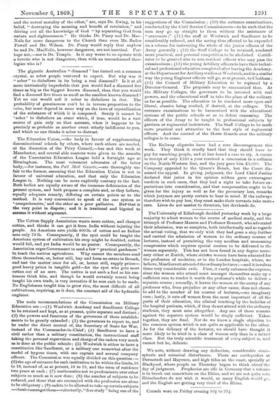The main recommendations of the Commission on Military Education are
:—(1) Woolwich Academy and Sandhurst College to be retained and kept, as at present, quite separate and distinct ; (2) the powers and functions of the governors of these establish- ments to be greatly extended ; (3) the governors to report to, and be under the direct control of, the Secretary of State for War, instead of the Commander-in-Chief ; (4) Sandhurst to have a civil rather than a military constitution, the instructional staff taking the personal supervision and charge of the cadets very much as is done at the public schools ; (5) Woolwich is either to have a constitution like Sandhurst, or a military one somewhat after the model of bygone times, with one captain and several company officers. The Commission was equally divided on this question :— (6)the age of entrance for each institution to be within the limits,16 to 18, instead of, as at present, 16 to 19, and the term of residence two years at each ; (7) mathematics not to predominate over other subjects so much as it now does ; (8) the number of subjects to be reduced, and those that are connected with the profession are alone to be obligatory ; (9) cadets to be allowed to take up certain subjects —classics amongst them—voluntarily, "free study" being one of the suggestions of the Commission ; (10) the entrance examinations, conducted by the Civil Service Commissioners—to be such that the men may go up straight to them without the assistance of " crammers ;" (11) the staff at Woolwich and Sandhurst to be considerably reduced, and the saving thus effected to be expended on a scheme for instructing the whole of the junior officers of the Army generally ; (12) the Staff College to be retained, rendered more practical, and personal competition to be abolished. Certifi- cates to be granted also to non-resident officers who may pass the examinations ; (13) the young Artillery officers to have their techni- cal and professional education completed after leaving the Academy, at the Department for Artillery studies at Woolwich, and in a similar way the young Engineer officers will go, as at present, to Chatham ; (14) the Council of Military Education to be replaced by a Director-General. The proposals may be summarized thus. At the Military Colleges, the governors to be invested with real powers, and the educational staff to take the place of the military as far as possible. The education to be rendered more open and liberal, classics being studied, if desired, at the colleges. The entrance examinations to be harmonized with the educational systems of the public schools so as to defeat cramming. The officers of the Army to be taught in professional subjects by garrison or regimental instructors. The Staff College to be made more practical and attractive to the best style of regimental officers. And the control of the Horse Guards over the militarY colleges is to cease.






























 Previous page
Previous page